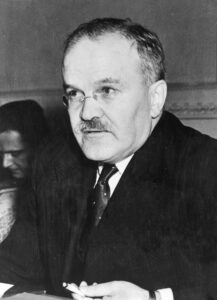Vyacheslav Molotov

Molotov was a main signatory of the Nazi-Soviet non-aggression pact from 1939 (also known as the Molotov Pact) whose most important provisions were in the form of a secret protocol envisoning the invasion of Poland and the division of East-Central Europe between Nazi Germany and the Soviet Union. Molotov knew about the Katyń massacre perpetrated at that time by Soviet authorities. After the Second World War, Molotov was involved in negotiations with Western Allies in which he gained fame through his diplomatic skills. Until the end of his life, Molotov was a fervent communist and defender of Stalin’s policies and heritage against harsh criticism by his successors.
Treaty of Non-Aggression between Germany and the Union of Soviet Socialist Republics
Neutrality pact between Nazi Germany and the Soviet Union signed in Moscow on August 23, 1939, by foreign ministers Joachim von Ribbentrop and Vyacheslav Molotov, respectively.
In addition to publicly announced stipulations of non-aggression, the treaty included a secret protocol which defined the borders of Soviet and German spheres of influence across the territories of Poland, Lithuania, Latvia, Estonia, and Finland.
Thereafter, Germany invaded Poland on 1 September 1939.
Soviet leader Joseph Stalin ordered the Soviet invasion of Poland on 17 September.